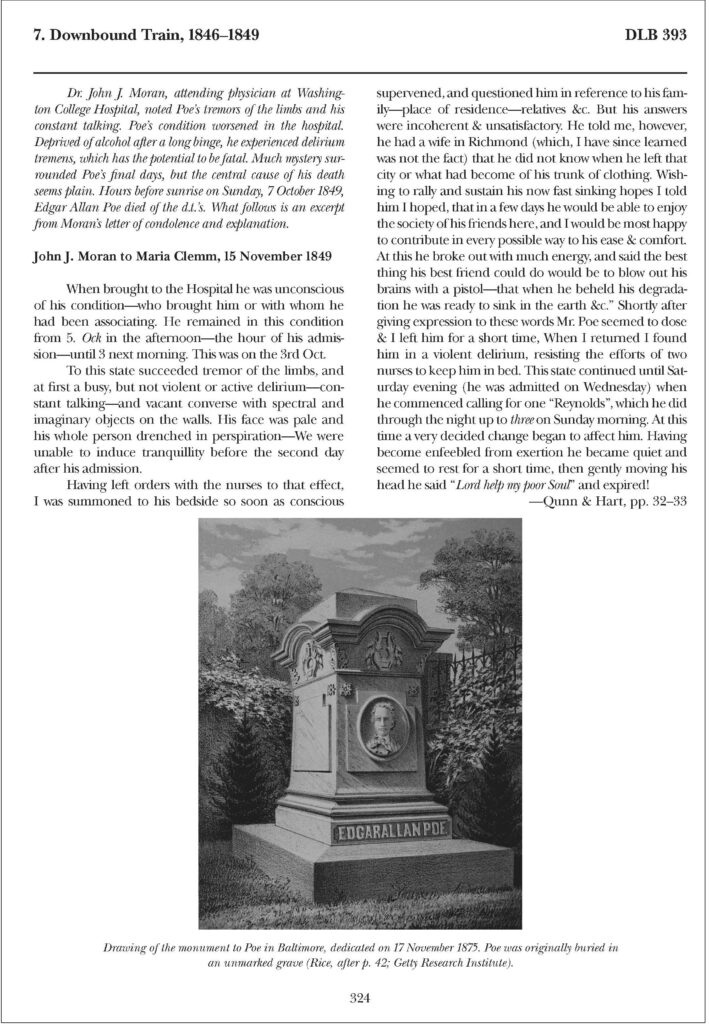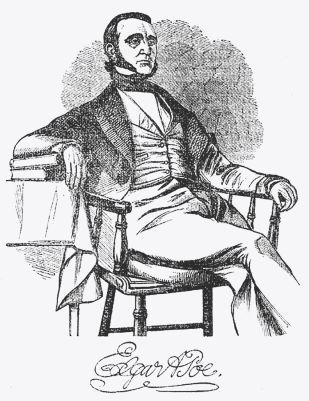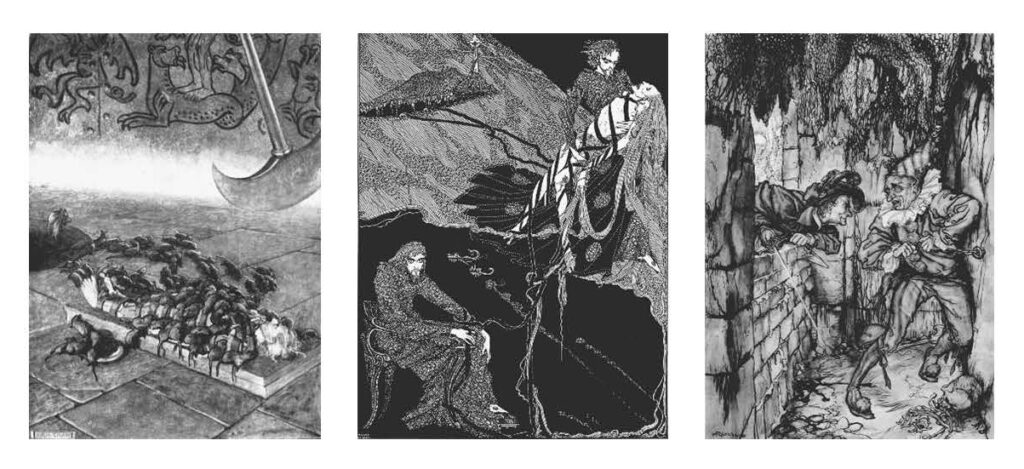| By Kevin J. Hayes, Guest Contributor |
Although readers will often dip into the Dictionary of Literary Biography 393: Edgar Allan Poe: A Documentary Volume to find facts, leaf through the copious illustrations, and read individual items pertinent to their interests, this documentary biography can be read cover to cover, in the same way as a narrative biography. In many ways, Edgar Allan Poe’s story is sad—his life marked by tragedy and poverty, the harsh exigencies of the literary marketplace, and alcoholism. Yet it’s consequential and exciting as well, yielding achievements—including the invention of the detective story and early works of science fiction—that endured and shaped American literature. The story is told here by numerous voices—from those who detested his behavior to those who admired his qualities; from those who abhorred his writing to those who were astonished by his originality and versatility.

The work of Poe’s biographers has been and continues to be a matter of extricating Poe from the malicious lies of Rufus W. Griswold, who for reasons that remain mysterious became Poe’s literary executor and compiled a four-volume edition of his work that undermined, even as it perpetuated, Poe’s literary reputation. In his biographical accounts, Griswold presented Poe as a half-crazed misanthrope and put forth a steady stream of misinformation about his life, giving others license to publish their own attacks on Poe, who had gathered many enemies owing to his years as an unsparing critic. Although Poe’s admirers also published reminiscences, they wrote in the charged atmosphere of Griswold’s dark portrayal, which often affected how they remembered their friend. This documentary volume presents several contrasting views of Poe, seeking a balance that shows the complexity of the man and the strong impressions he made upon his contemporaries. Readers of the entire volume will be able to come to their own informed conclusions about this fascinating artist.
Image Credit: Dictionary of Literary Biography 393: Edgar Allan Poe: A Documentary Volume:
chapter 5, p. 192.
Image Credit: Dictionary of Literary Biography 393: Edgar Allan Poe: A Documentary Volume: chapter 2,
p. 82.
Image Credit: Dictionary of Literary Biography 393: Edgar Allan Poe: A Documentary Volume:
chapter 7, p. 291.
The Dictionary of Literary Biography 393: Edgar Allan Poe assembles a set of documents reflecting a fresh, forward-thinking perspective on Poe’s life and works. Poetry was Poe’s first love, and his first three books were short, overlapping collections of verse, published at the ages of 18, 20, and 22. The first chapter of this volume, “1. Birth of a Poet, 1809–1831,” presents Poe’s life from his birth to the publication of Poems by Edgar A. Poe, Second Edition (1831). Poe’s early attention to poetry prompted many biographers to emphasize his verse, which was more conventional and less influential than his extensive critical writings or, especially, his short stories. The remaining chapters— “2. The Switch to Prose, 1831–1837”; “3. The Life of an Unemployed Magazinist in Jacksonian America, 1837–1839”; “4. The Philadelphia Literary Scene, 1839–1842”; “5. Phantasy-Pieces, 1842–1844”; “6. The Broadway Journal,1845”; and “7. Downbound Train, 1846–1849”—emphasize his short fiction. Particularly after his marriage in 1836 to his young cousin, Virginia Clemm, Poe was primarily concerned with making a living as a writer. For years, his greatest dream was to become the proprietor and editor of his ideal magazine, which he imagined would afford him a measure of financial stability; but regrettably, this quest took away time that he might have spent writing stories.

To make this work an important contribution to Poe scholarship, the editor gives priority to new findings; that is, articles about Poe that have never been recorded or reprinted. These discoveries throw light into the shadowy corners of Poe’s life and critical reception. Different types of documents also help make Poe’s story new. Previous biographers have relied too heavily on Poe’s letters, which tell a pitiful story. The phrase “Poor Poe” often occurs in writings about him, but Poe invented this lament. His letters are filled with stories of how poor he is, how little people understand him, and how much he was being ignored. Though the present collection includes a handful of excerpts from Poe’s best letters, it prefers to let other types of documents tell his story

The decision regarding what types of documents to include contributes to the originality of the present collection. Since Poe’s letters have recently been collected and annotated in a new edition, few need to be repeated here. Since the editors of Poe’s correspondence omitted letters to him, many are included here. Other types of documents—book reviews, reminiscences, excerpts from Poe’s reading, extracts from newly discovered sources for Poe’s fiction—provide more new information. In his time, Poe was recognized as a popular poet, a feared reviewer and critic, and a controversial writer of weird tales. In retrospect, he should be acknowledged as the most innovative and original fiction writer the United States has ever known and one of the finest short fiction authors in world literature.

About the Author
Kevin J. Hayes is emeritus professor of English at the University of Central Oklahoma. He is the author of several books about American literature and culture, including Edgar Allan Poe. He lives and writes in Toledo, Ohio.




